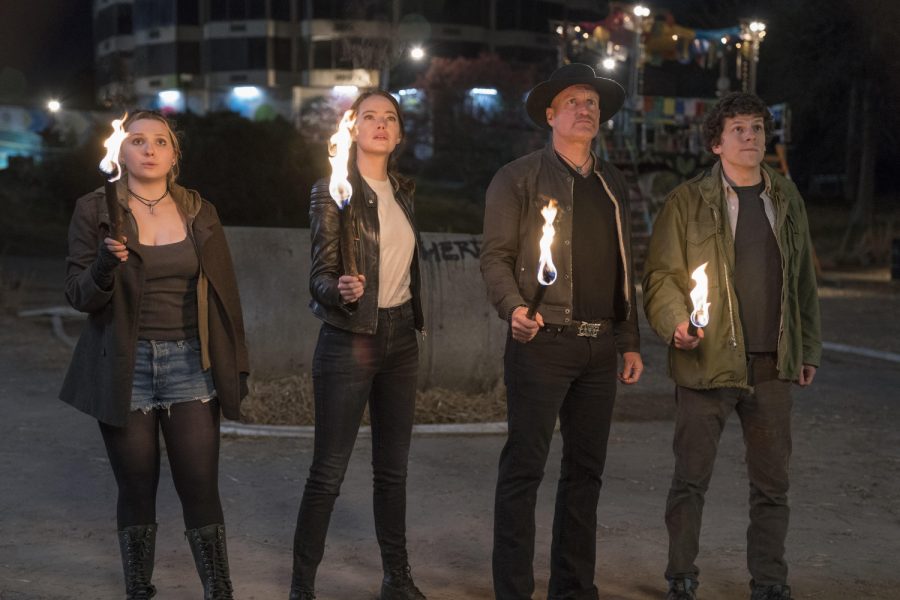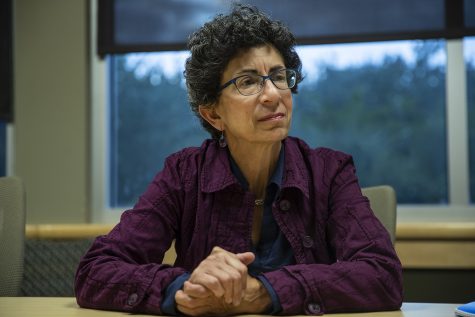Opinion: Zombieland: Double Tap is fun, but yet another unnecessary sequel
The zombies are back, the Twinkies are gone, and I should have stayed home.
Little Rock (Abigail Breslin), Wichita (Emma Stone), Tallahassee (Woody Harrelson) and Columbus (Jesse Eisenberg) appear in a scene from "Zombieland: Double Tap."
October 31, 2019
Tallahassee, Columbus, Wichita, and Little Rock are back at it 10 years later in Zombieland: Double Tap. Between killing zombies and taking over the White House, our favorite unlikely heroes are the throwback we didn’t need but likely deserve.
If it wasn’t for the addition of Zoey Deutch’s bubbly and slightly eccentric character — or the epic Bill Murray end credit — the film does little to move the story forward from the glory days of Jersey Shore and Kanye West interrupting Taylor Swift.
To be honest, as with most successors in the film world, Zombieland: Double Tap failed to live up to the hype and tainted the original film in the process — at least for me.
In fact, the best parts are when it pokes fun at the original film. Some of these include replacing Woody Harrelson’s Tallahassee Twinkie addiction with his love for Elvis Presley or running into doppelgängers that are ironically annoying. There’s even a scene when the Tallahassee look-alike makes fun of Harrelson’s catchphrase “nut up or shut up,” calling it “so 2009.”
But the traits that made the original film work, instilling it in pop culture, just aren’t hitting the same way the second time around. The act of leaving notes and stealing the squad’s car in the middle of the night is exhausted. The constant reinforcement of Columbus’s 73 rules to survive Zombieland is eye-rolling. Even the Terminator T-800 zombies left me feeling bored.
It’s one thing to reference the original to be facetious, but the film’s new story revolves around callbacks like a crutch.
But this could simply be due to the cinematic subjectivity I mentioned in a previous article I’ve written.
I overheard a fellow moviegoer giving the film “a solid 8” in the lobby of the theater.
After my eyebrows resumed their regular position, I considered the idea that maybe I’m just biased against sequels. It’s one thing to reference the original to be facetious, but the film’s new story revolves around callbacks like a crutch. Maybe a sequel isn’t necessary then, right?
This one in particular is about more than leaving well-enough alone. It’s the fact that Zombieland: Double Tap brought its world to the big screen one more time as a vehicle for fooling around and doing drugs. I get it, sex sells and people get high. But quality cinema and truly humorous storylines do the trick just as well.
Perhaps filmmakers are trying to appeal to what they think the audience is interested in and what that particular audience does. But when did Hollywood begin to veer from providing us with stories that make us question the big picture in exchange for creating movies with the mere hope that we’ll like it?
With the vicious battle between theaters and streaming services, I understand that filmmakers aren’t in the position to pride artistic flair over ticket sales. But if the theater industry and Hollywood don’t find a solution soon, then it seems inevitable for streaming services to come out victorious.
Why wouldn’t a budding, independent director choose Netflix over the box office when they get to make the work they’re passionate about? Heck, some of the latest films I’ve seen in the theater are also available on Netflix. I recognize that I’m a dying breed by preferring to watch movies at the theater, but perhaps I’m a hopeless romantic about times gone by.
In the end, this preference is all about practicality and — as seen in Zombieland: Double Tap — poor storytelling.


















